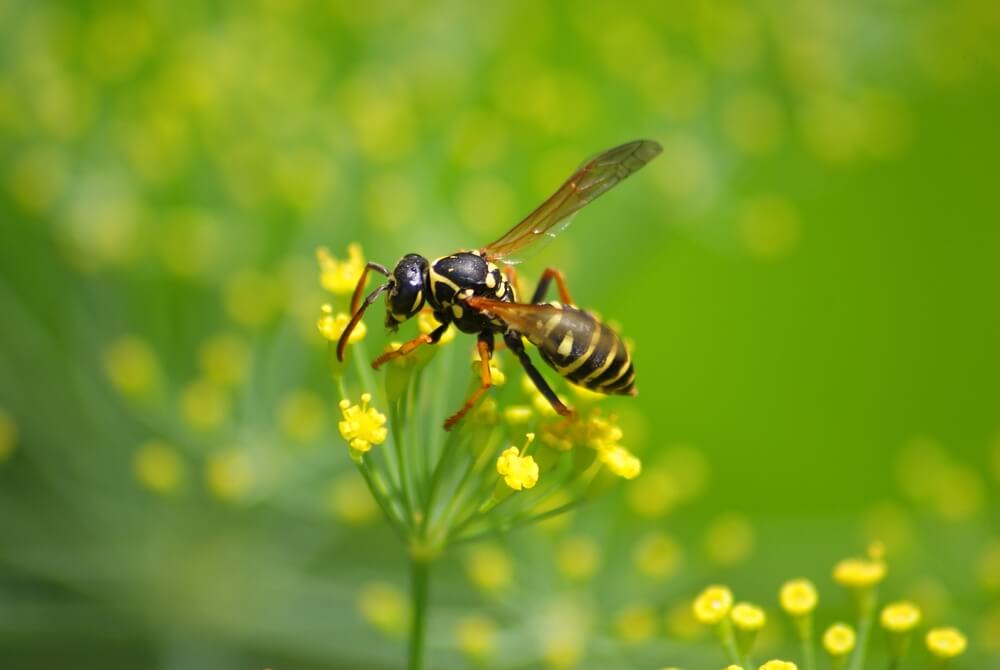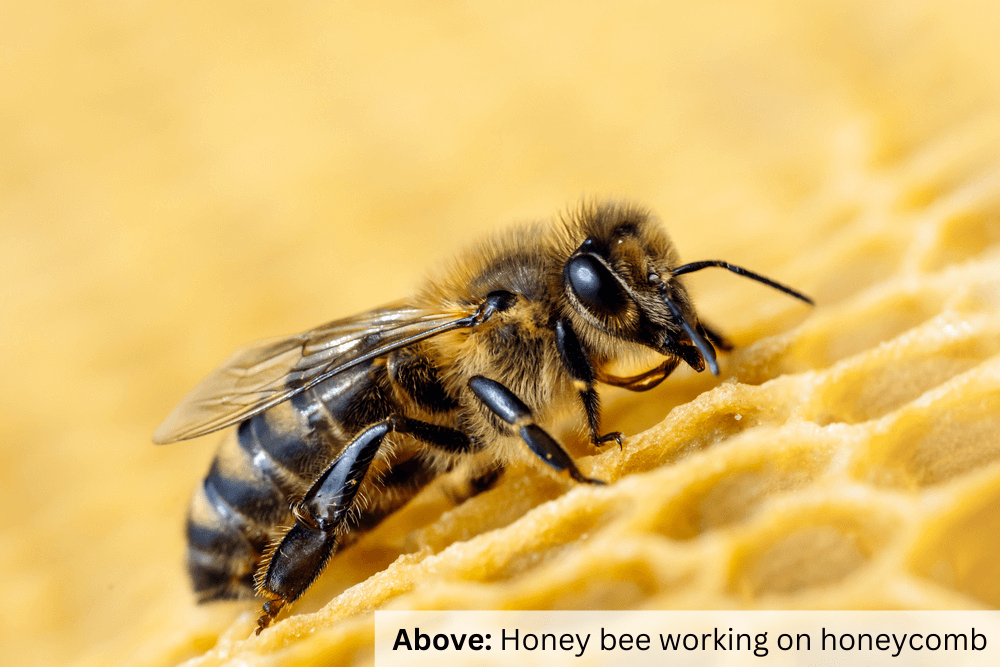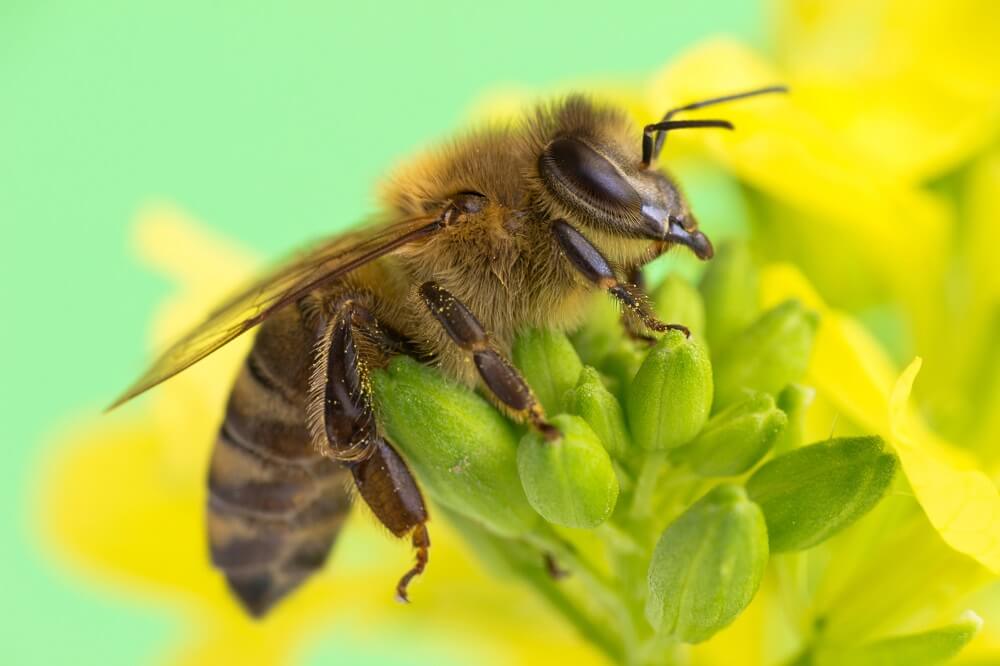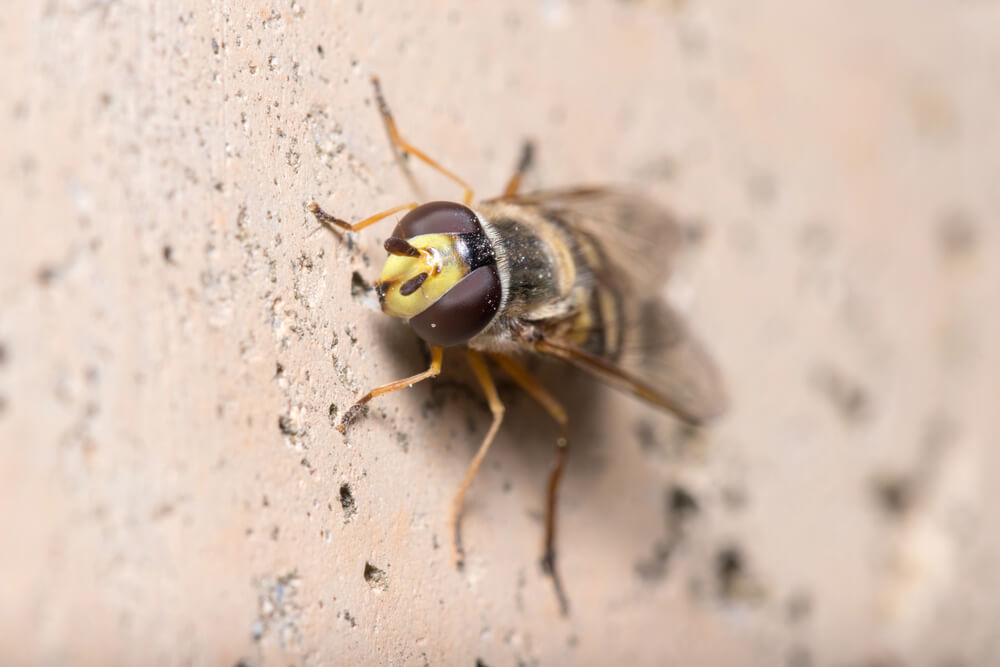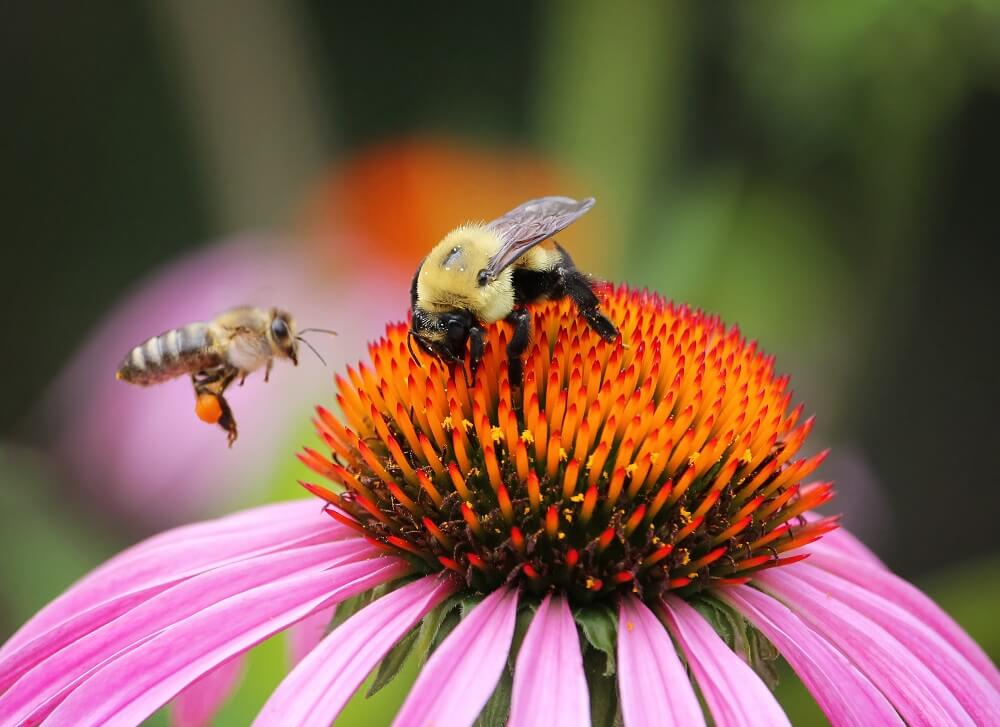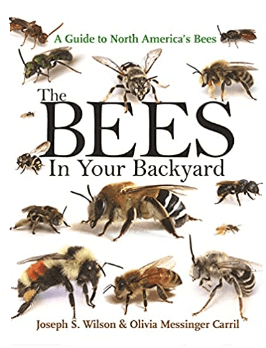Table of Contents:
Are Wasps Pollinators?
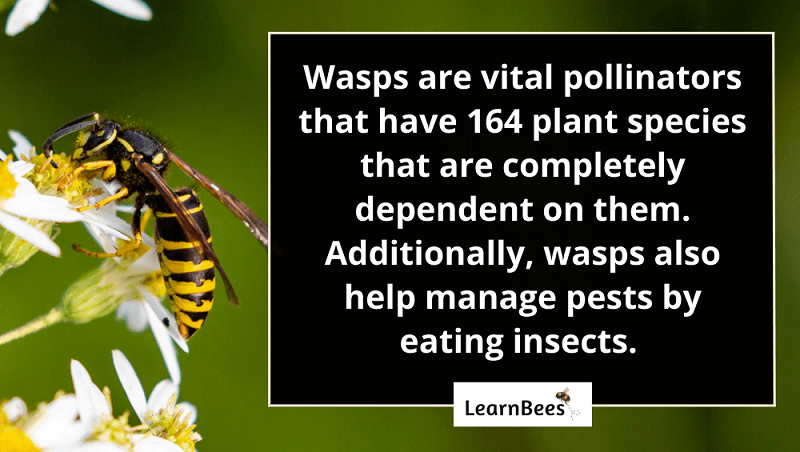
Wasps are crucial pollinators that we need in our ecosystems. In fact, there are more than 150 plant species that rely on wasps for pollination.
Better yet?
Some plants have even evolved special tricks to attract wasps. For example, warty hammer orchids (Drakaea livida) entice male wasps by imitating the smell and look of female wasps.
Wasps are also avid pollinators of nearly 1,000 fig species.
Fresh figs taste like berries covered with a honey glaze. They’re delicious, healthy, and a staple in warm areas like California and the Mediterranean.
And here’s the thing:
Wasps pollinate the same way bees do.
They both pollinate plants by collecting pollen on their fuzzy bodies while drinking flower nectar. In turn, some pollen grains fall off the wasp as it flies between flowers. This process helps fertilize plants so they can make seeds.
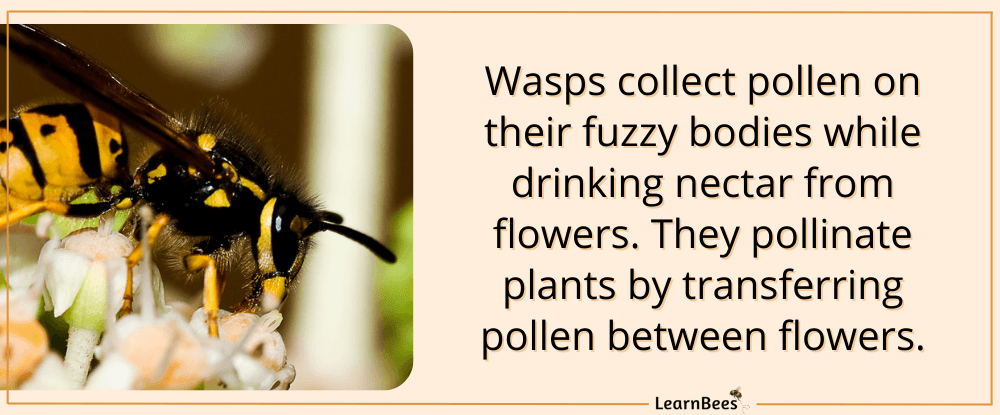
But not all wasps appear fuzzy like bees do.
And actually, most wasps look shiny and hairless at first glance. It’s not until you look at them with a magnifying glass that you’ll notice dozens of tiny hairs.
These body hairs are small and mighty, helping wasps pollinate thousands of different plant species around the globe.
Now I should issue a warning.
Some people claim that wasps aren’t pollinators. However, these people are misinformed. This belief usually stems from not knowing that wasps have body hairs like bees do.
Interestingly enough?
Wasps not only pollinate, but they also help eat invasive pests that overrun our food crops.
Cabbage worms, beetle larvae, and aphids cause serious damage to vegetables and fruits. As such, farmers and gardeners are increasingly turning to wasps to control pests.
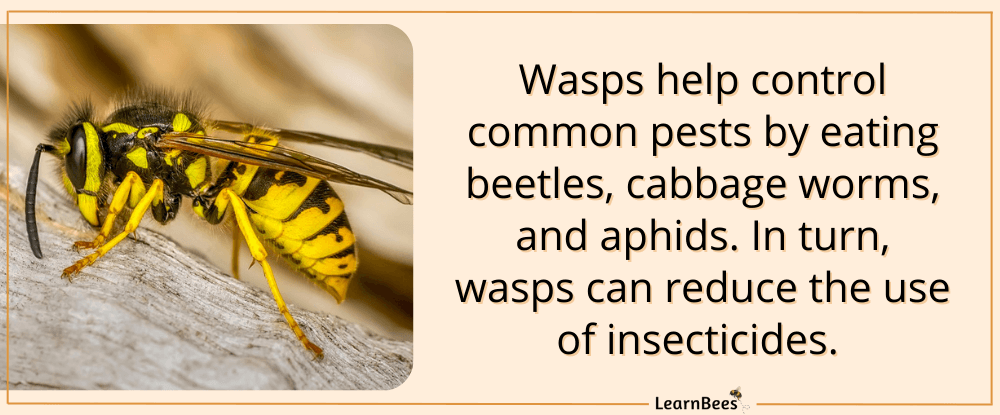
Not only that:
Ecologists commonly release wasps to control non-native bugs that destroy plants and harm local habitats.
For instance, the emerald ash borer (Agrilus planipennis) is a shiny, green beetle from Asia. They were brought to North America decades ago. Unfortunately, these invasive beetles kill ash trees by burrowing into the bark and stealing the tree’s nutrients.
This is where wasps have come to the rescue.
Wasps are currently being used to restore ash forests by killing this harmful beetle.
So, to put it simply?
We need wasps for pollination. Additionally, a world without wasps would require the use of more harsh chemicals used to control pests.
Not good.
Do Wasps Pollinate as Much as Bees?
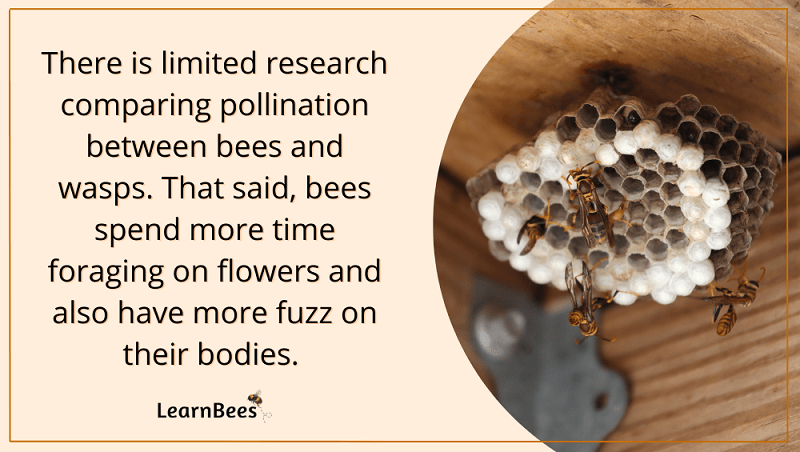
The research comparing wasp pollination to bee pollination is limited. Fortunately, this is gradually changing as scientists continue studying wasps’ importance.
With that said:
Bees are generally covered in more body hair than wasps. As a result, this leads scientists to believe that bees are more efficient pollinators than wasps.
Take bumble bees, for instance.
There’s an obvious difference between a bumble bee’s body hair and a wasp’s body hair.
You don’t need a magnifying glass to notice that bumble bees are covered in thick fuzz. Bumble bees are also generalist feeders that visit a wide range of flowers. Together, these things make them incredible pollinators.
But that’s not all.
Bees also tend to spend more time foraging on flowers than wasps do. In fact, one key difference in telling wasps apart from bees is to look at how long they spend on flowers.
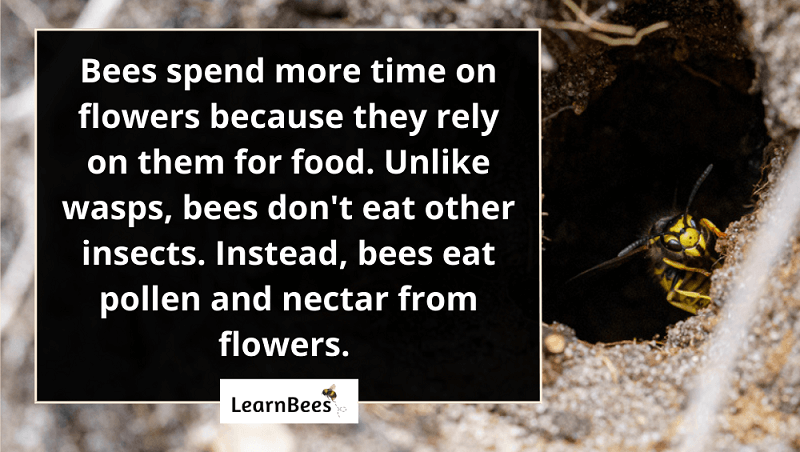
Bees often work from dawn to dusk to collect pollen and nectar from blossoms. After all, pollen and nectar are a bee’s primary food source.
Wasps are different.
Unlike bees, wasps rely on food from both insects and flowers. Wasps are omnivores, while bees are vegetarians.
As such, bees spend more time around flowers because that’s primarily what their diet consists of. They have limited choices.
The same is true for other pollinators like hummingbirds and ladybugs, who also don’t rely on flowers as their sole food source. They’re beneficial pollinators that also eat insects. With that in mind, other pollinators can’t necessarily compete on the same pollination scale as bees.
But you know what?
Bees don’t eat bugs, so they can’t compete with wasps regarding pest control.
This shows that all things – big and small – play their special part in this world.
Should You Leave Wasps Alone?
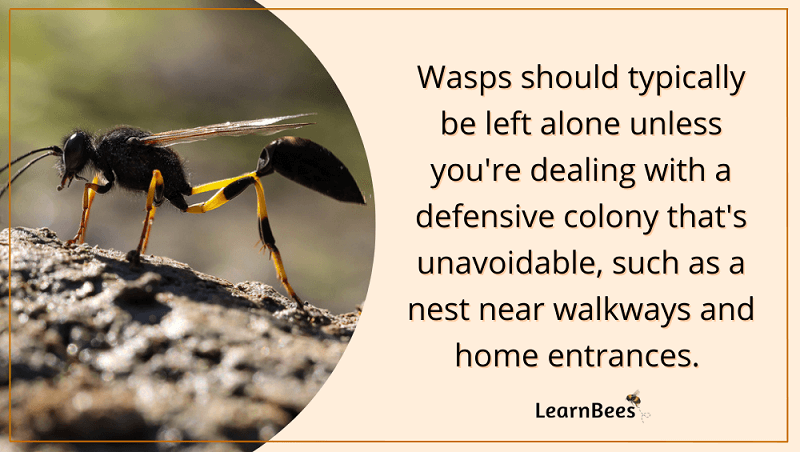
Due to their critical role in our environment, wasps should generally be left undisturbed.
You may commonly spot certain wasps nesting under your home’s porch, carport, or other eaves. The good news is that these wasps will typically leave you alone if you don’t poke around their nest.
To take it a step further?
These wasps die off in the winter. When the cold weather hits, you can knock down their old nests and hang wasp deterrents to prevent them from returning in the spring.
The only time wasps should be removed is if you’re dealing with a defensive colony around people or animals.
For example, you may consider removing a yellowjacket nest if it’s near an unavoidable walkway. You can also remove wasp nests if they’ve found themselves inside your home, such as inside an attic or fireplace.
Otherwise, it’s best to leave other wasp nests alone until winter, when you can knock down their abandoned nests or cover the underground holes they may live in.
FAQs On “Are Wasps Pollinators?”
- Are wasps pollinators or predators?
- Do yellowjackets and wasps pollinate?
- Are wasps good for the garden?
- Does the ecosystem need wasps?
- What is the point of a wasp?
- Should you get rid of wasps that pollinate?
- Are all wasps pollinators?
- Are paper wasps pollinators?
- Do red wasps pollinate?
- Do brown wasps pollinate?
- Are wasps important?
Are wasps pollinators or predators?
Wasps are both pollinators and predators of insects. They feed on nectar which helps pollinate plants, and they hunt for insects which helps to control the populations of pests.
Nectar provides the wasps with carbohydrates and energy, while insects provide them with protein. Wasps hunt for worms, aphids, spiders, and many other insects. Aphids, for example, are common garden pests that feed on the leaves and stems of plants. By hunting these pests, wasps provide gardeners with an essential service.
—> Go back to the FAQs on “Are Wasps Pollinators?”
More to Explore:
- Do Wasps Make Honey?
- What’s the Difference Between Wasps, Hornets, and Bees?
- Wasp Nest vs. Bee Nest: Which One Is It?
Do yellowjackets and wasps pollinate?
Yellowjackets and other wasps pollinate flowers which help plants reproduce. Pollination is the transfer of pollen from the male part of a flower (the anther) to the female part (the stigma). The process is essential for cross-pollinated plants and allows them to produce fruits, vegetables, or other seeds.
—> Go back to the FAQs on “Are Wasps Pollinators?”
More to Explore:
Are wasps good for the garden?
Wasps are good for gardens because they pollinate flowers and control pests. It’s not uncommon to see wasps working alongside bees to forage for nectar on blossoms. In turn, wasps help contribute to a healthy ecosystem that is rich in biodiversity.
Additionally, they can help decrease the populations of invasive pests in your garden by preying on them. This helps to keep a balance between predators and prey in the environment.
Many gardeners are familiar with common pests like spider mites and whiteflies. However, they don’t always realize that wasps help keep these pests in check.
—> Go back to the FAQs on “Are Wasps Pollinators?”
More to Explore:
- What Are Black and Yellow Wasps?
- Do Yellowjackets Sting or Bite?
- How Do You Get Rid of a Yellowjacket Ground Nest?
Does the ecosystem need wasps?
Ecosystems need wasps because they’re a critical part of the food chain. Wasps help to pollinate flowers, which helps plants reproduce and provide food for animals. They also feed on insects, helping to keep populations of bugs regulated.
—> Go back to the FAQs on “Are Wasps Pollinators?”
More to Explore:
What is the point of a wasp?
Wasps play an important role in nature by providing several benefits. They help to pollinate plants which help produce food for humans and animals. They also help manage insect populations by preying on them.
Additionally, wasps provide nutrients in the soil when they die off in the winter months. Dead bugs will improve your plant health by adding nutrients such as nitrogen into the soil. Plants use nitrogen to produce green, healthy leaves for photosynthesis. Dead organisms also provide an extra food source for beneficial bacteria and fungi within the soil.
—> Go back to the FAQs on “Are Wasps Pollinators?”
More to Explore:
Should you get rid of wasps that pollinate?
No, getting rid of wasps is not recommended because they’re essential pollinators. It’s best to leave them alone unless they’re in an area that may pose a danger to people or animals.
Solitary wasps, like mud daubers commonly found around homes, are gentle wasps that usually leave people alone. Social wasps, like yellowjackets, tend to be more defensive because they’re protecting their entire colony.
Nevertheless, social wasps should also be left alone unless they’re in an area you can’t avoid.
—> Go back to the FAQs on “Are Wasps Pollinators?”
More to Explore:
Are all wasps pollinators?
Yes, all wasps are considered pollinators. Wasps feed on nectar from flowers, which helps to spread and fertilize flowering plants. This process is essential for cross-pollinated plants as they need pollinators to produce fruit or vegetables.
—> Go back to the FAQs on “Are Wasps Pollinators?”
More to Explore:
Are paper wasps pollinators?
Yes, paper wasps are also considered pollinators. They’re often located around flowers to collect nectar.
Nectar is a sweet substance produced by flowering plants that provide energy to the wasps in the form of carbohydrates. In turn, wasps spread pollen around plants, allowing them to make seeds to ensure the next generation of plants.
—> Go back to the FAQs on “Are Wasps Pollinators?”
More to Explore:
Do red wasps pollinate?
Yes, red wasps are also pollinators. They collect pollen from flowers and help distribute it around plants. As they collect nectar, they leave traces of pollen on the flower’s stigma. This process is essential for cross-pollinated plants and ensures their survival.
In addition to pollinating flowers, red wasps also help manage pest populations by preying on them. This helps keep a balance between predators and prey in the environment. The process of wasps pollinating is essential to maintain healthier gardens and ecosystems.
—> Go back to the FAQs on “Are Wasps Pollinators?”
More to Explore:
Do brown wasps pollinate?
Yes, brown wasps also help pollinate plants. They collect nectar and pollen from flowers which help to fertilize cross-pollinated plants. This process is not only essential for the survival of many flowering plants, but it also allows them to produce fruits or vegetables.
—> Go back to the FAQs on “Are Wasps Pollinators?”
More to Explore:
- How to Repel Bees Without Killing Them
- How to Get Rid of a Bumble Bee
- What Are the Four Stages of the Bee Life Cycle?
Are wasps important? Are wasps beneficial?
Wasps are very important. They get a bad rap for being aggressive, stinging insects, but they provide many benefits. Additionally, wasps aren’t as aggressive as most people believe. They typically only sting if you get too close to their nest.
More importantly, wasps are beneficial because they’re pollinators that also control insect populations. So not only do wasps help flowers grow, but they also kill off pests that attack the plants in the first place.
This is why it’s crucial to leave wasps alone unless they directly disturb you, your children, or your pets. Many entomologists believe that wasps should be respected in the same ways that bees, butterflies, and ladybugs are.
